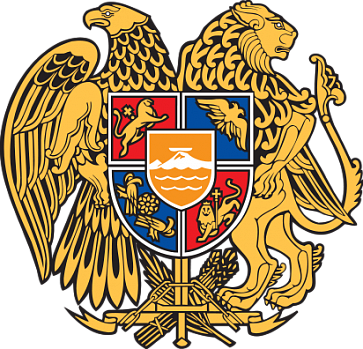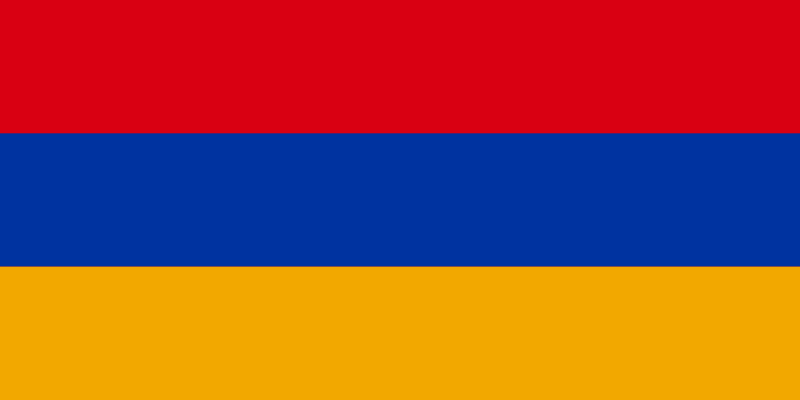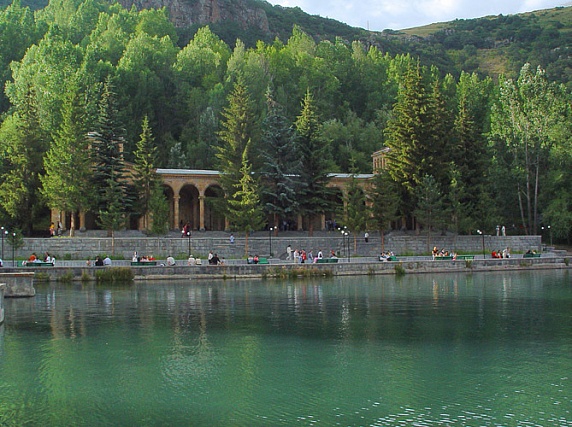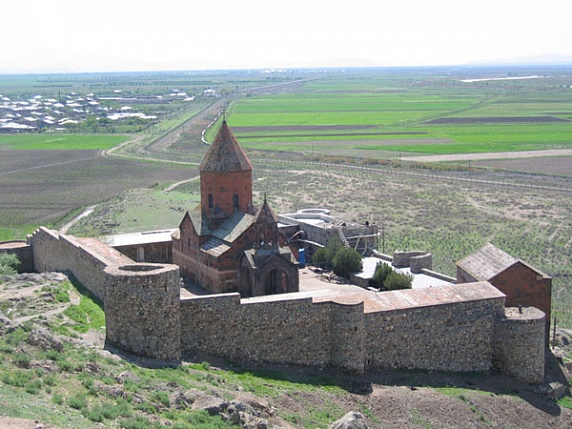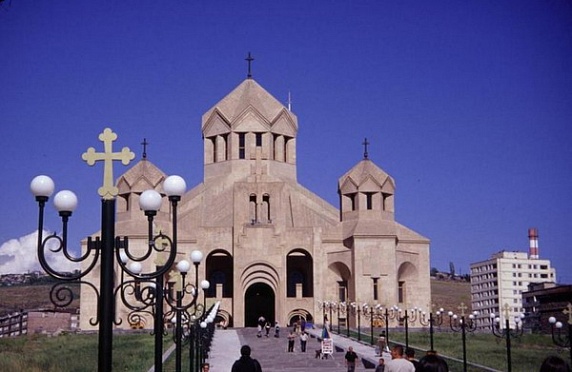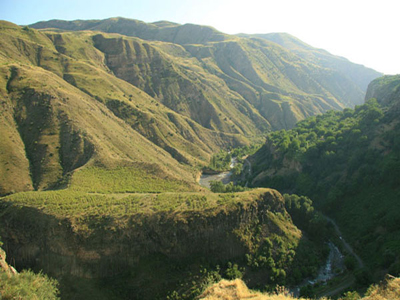 la República de Armenia
la República de Armenia
Foreign Minister Sergey Lavrov’s remarks and answers to questions from Diplomatic School graduates and university students, Yerevan, November 11, 2019
Colleagues,
I am grateful to the Diplomatic School’s senior officials for the invitation. Now that I’m here again in friendly Armenia, I can talk with young people who have chosen international relations as a profession. It is a fascinating subject. Every time I’m in Yerevan or elsewhere in Armenia I can see how deep and diverse the ties between our countries and peoples are. These ties are held together by common history and a cultural and spiritual legacy and plain human friendship.
I understand that we have professors and students from leading Armenian universities in this audience, which makes our meeting even more meaningful and interesting. Our relations, which have withstood the test of time, rely on strategic partnership and alliance and continue to progress across all areas. Regular contacts at the highest level continue to promote this work. President of Russia Vladimir Putin and Prime Minister of Armenia Nikol Pashinyan have met four times this year alone, and more meetings are coming. The same goes for contacts at the heads of government level.
Significant results have been achieved in trade and the economy. There is every indication that trade will exceed $2 billion this year for the first time ever. Large cooperative projects are being completed in industry, energy, transport, agriculture, finance and lending; good prospects can be seen in high technology.
Region-to-region relations are fairly dynamic with 70 Russian regions and almost all administrative and territorial units of the Republic of Armenia participating in them. Cultural exchanges are gaining momentum, including in education and research, as well as in information, sports and art. We are grateful to our Armenian friends for preserving and promoting the Russian language in their country. In May 2020, we will mark the 75th anniversary of Victory in the Great Patriotic War. Time and again, together with our Armenian friends, we emphasise the need to cherish the memory of our heroes and take good care of our veterans. Yesterday, my colleague, Foreign Minister Zohrab Mnatsakanyan, and I opened an exhibition dedicated to the 75th anniversary of the Great Victory in the National Art Gallery. We agreed on numerous additional events in our countries in the bilateral format and as part of international organisations.
Foreign policy dialogue is an integral part of interaction between Russia and Armenia and its importance is increasing. You see that the world is really undergoing tectonic shifts. All the familiar patterns which have been used for centuries to assess international relations are changing right before our eyes. The world is moving towards a multipolar order, which is objectively being formed on our planet. New global centres of economic growth, financial power and, accordingly, political influence are emerging in the Asia-Pacific region and other parts of the world, such as the Middle East, Latin America and Africa. Numerous and sometimes competing and intertwining integration processes are unfolding.
In general, international relations are becoming more complex and multidimensional to the point where no state or even a small group of countries acting alone is capable of ensuring sustainability in global development or effectively coping with the many threats, the number of which is on the rise: from terrorism to the risks of proliferation of weapons of mass destruction. Therefore, it makes sense for the key issues that concern all of humanity to be submitted for consideration not by seven leading Western states, as was the case 20 years ago, but the Group of Twenty which is an inclusive and authoritative global governance mechanism that meets the realities of the 21st century. Along with the G7 members, it includes the BRICS participants and like-minded countries that advocate somewhat different approaches to resolving international challenges, which imply a search for a balance of interests, rather than setting up the agenda in privy, and then presenting these decisions as the ultimate truth. This will not work any longer. To reiterate, the G20 has an important symbolic and major practical significance.
We are convinced that it is in our common interest to ensure a progressive and peaceful transition to a new world order. It should be fair and democratic, and rely on the balance of interests of all members of the international community, without exception, rather than brute force. If we once talked about a “concert of great powers,” now we need to create a kind of “global concert” which takes into account the interests of every country without exception.
Russia is a responsible guarantor of the emerging polycentric global architecture. We are promoting a constructive and unifying foreign policy agenda focused on preventing confrontation in the international arena and strengthening global and regional security.
Our unconditional priorities include the further build-up of bilateral and multilateral cooperation in Eurasia. In this regard, we highly value the current level of coordination with our Armenian friends in associations such as the CSTO, the CIS, and the EAEU. These structures have firmly established themselves as essential stabilising factors in the post-Soviet space. I would like to highlight our plans to reinforce the CSTO, which reliably ensures the military-political interests of all allied members of this organisation. The EAEU was created after the CIS and the CSTO, but is making great strides. In a relatively short period, we have managed to form a common market for goods, services, capital and labour. It took the EU much more time to accomplish this.
So, I think our Armenian colleagues, who chaired the EAEU this year, fully feel the advantages of their EAEU membership. According to statistics, mutual trade between Yerevan and other EAEU members has grown by almost 40 percent over the past three years. Armenia has seen new economic growth opportunities, including through the acquisition of raw materials and resources without export duties and tariffs, as well as mutual recognition of trade documents.
Moreover, the EAEU is not a closed club. Developing in full compliance with WTO precepts, the union is open to interaction with other countries and integration associations. Free trade agreements have already been concluded with Vietnam, Singapore and Serbia (the last two during Armenia’s presidency). A preliminary agreement has been signed with Iran, and talks are underway with dozens of other countries, including in the Middle East, Asia, Africa and Latin America. The signing of the Memorandum of Understanding between the Eurasian Economic Commission and ASEAN in 2018 came as an important step.
We launched a large-scale effort to coordinate Eurasian integration with the Chinese Belt and Road initiative. An agreement on trade and economic cooperation between the EAEU and China has already been signed. These relations continue to evolve in the form of new documents that are being drafted.
Overall, we are stimulating the efforts aimed at harmonising various integration projects that involve members of the EAEU, the SCO and ASEAN. These efforts create the foundation for the development of an innovation contour in Eurasia that will be free of any barriers and will be based on the principles of international law and the rules of World Trade Organisation, as well as respect for different development scenarios and the right of nations to choose their way forward. This philosophy is at the root of the Greater Eurasian Partnership initiative, which President Vladimir Putin put forth at the Russia-ASEAN summit. This initiative stems from the well-known idea of creating a common economic space from Lisbon to Jakarta, a territory of peace and equal and indivisible security for all its participants.
Of course, our dialogue with Armenia is not limited to the post-Soviet space. We maintain close contacts and coordinate our actions at the UN, the OSCE, the Council of Europe and the Organisation of Black Sea Economic Cooperation (BSEC). I would like to take this opportunity to speak about our emergent cooperation in Syria, first of all, the provision of humanitarian aid to the Syrian people. Our military doctors and demining experts are fruitfully cooperating on the ground. The Syrians themselves, including the Armenian community in Syria, have noted this. Russia has done a great deal towards the convocation of the Constitutional Committee that will determine a political solution to the Syrian crisis. A female representative of the Syrian Armenians is working on the committee. Another of our missions is to provide assistance to the Christians of the Middle East, who have fallen victim to short-sighted geopolitical experiments and fled the countries where their forefathers lived for centuries.
Dear friends,
All of us want to live in a friendly external environment, the so-called neighbourhood belt. It is in our common interests to have a stable, safe and prosperous South Caucasus. Unfortunately, the situation in the region remains complicated. Problems in relations between Georgia, Abkhazia and South Ossetia have not been settled. At the same time, the Geneva International Discussions on regional stability, which were launched with Russia’s active involvement, helped maintain peace for over 11 years, without a single major outbreak of hostilities and with relative stability on the border. It is clear that the overall improvement in the region can be facilitated by a non-use of force agreement between the participants in the Geneva discussions, which is in the final stages of coordination. This would allow the sides to start discussing the essence of a peaceful political settlement between Tbilisi, Sukhum and Tskhinval.
As for Nagorno-Karabakh, we wholeheartedly want to see peace there, so that no more people die in hostilities, the region has open borders and the sides resume economic ties. In addition to the efforts to reduce military risks and promote humanitarian interaction, Russia has been working consistently to help coordinate the political principles of a settlement. While mediating the conflict, we are not trying to force any ready-made recipes onto Armenia and Azerbaijan. They must find a solution themselves, without any external pressure, artificial deadlines or arbitration. This is our firm position. We will support any solution that suits all the involved sides. And when such a solution is coordinated, we will act as its co-guarantor together with the other co-chairs of the OSCE Minsk Group.
We believe that the majority of current problems can be settled if the deplorable methods of dictate and pressure are replaced with the universal values of dialogue, mutual respect and cooperation. A case in point is the Caspian problem, which was settled when we signed the Convention on the Legal Status of the Caspian Sea and also created a system of legal, economic and political mechanisms for effectively balancing the interests of all the Caspian states and formalising their responsibility for developments on the sea.
Russian diplomats will continue working to restore the culture of dialogue and compromise and to demilitarise the foreign policy mentality. We will insist on the reaffirmation of the inviolability of the fundamental tents of international law, such as respect for sovereignty, noninterference in the internal affairs, nonuse of force or the threat of force and the right of nations to self-determination. I believe that we will remain at one with our Armenian friends in this.
Friends,
Today, Armenia is addressing large-scale tasks to ensure its sustainable socioeconomic development. And the Armenian people – one of the oldest peoples [in the world] possessing rich traditions and customs as well as a high culture – is able to cope with this. Russia is always ready, if necessary, to be nearby and lend a helping hand.
Outstanding Russian writers and poets – Anna Akhmatova, Valery Bryusov, Osip Mandelstam, and many others – wrote lovingly about Armenia and deservedly called it “a book that taught the first people” and “Europe’s vanguard in Asia.” I am confident that if we read the classics, we can find many other comparisons, of which you, by right, should be proud.
Question: After the 2018 revolution in Armenia, many experts said that Armenia would change its foreign policy vector. Russian experts, among others, were worried about this. Today, one and a half years later, can it be claimed that this concern no longer exists and that Russia is certain that Armenia is its reliable ally? Have Russia’s doubts that the revolution in Armenia had a colour or a certain factor been dispelled?
Sergey Lavrov: I will not analyse the terms – a revolution or something else. I have presented an assessment of our relations in my opening remarks. These relations are following an upward trend and they ensure continuity in what concerns the existing bilateral agreements and obligations within the CIS, the CSTO and the EAEU. I think we can put the matter to rest at this.
Question: Most recently, certain third countries have been trying to cast aspersions on the Armenian people’s contribution to the fight against Nazism. Regrettably, some quarters in Armenia are apprehensive that even Russia does not appreciate the Armenian contribution to the Great Victory. I would like to know your opinion on this matter.
Sergey Lavrov: I mentioned this topic during my remarks at the opening of an exhibition dedicated to 75th anniversary of the Victory in the Great Patriotic War. I emphasised how highly we appreciated the Armenian people’s contribution to the fight against Nazism and how we valued cooperation with Yerevan, including within the CSTO, aimed at insisting in the UN and other organisations on the unacceptability of any moves to glorify Nazi criminals. We are cooperating on this, we are at one here.
Question: After the disintegration of the USSR, there are different views on the Russian people and their legacy. To what extent does Moscow appreciate the Armenian concern for the Russian cultural heritage in this country and generally our friendship with the Russian people?
Sergey Lavrov: Of course, we appreciate it! I also spoke about this. We see the Armenian authorities consistently support the Russian language. We hope this line will be continued without any rollbacks. This is because, first of all, the Armenians know and value Russian culture. Secondly, in a purely practical sense, a command of Russian provides additional opportunities for self-fulfilment across the entire post-Soviet space. This is an important factor, too. And, of course, [using the Russian] language as a means of international communications is also indicative of a nation’s level of civilisation.
Question: Each time Russian-Turkish relations get “warmer,” we, Armenians, think that this might be a threat to us. What consequences for the region as a whole and Armenia in particular can the Russian-Turkish rapprochement lead to?
Sergey Lavrov: As a matter of fact, I was answering the same question half an hour ago at a news conference in the Armenian Foreign Ministry. We live amid neighbours, who are determined by geography, history and the entire previous course of developments. We are interested in having good relations with all our neighbours, be it in the CIS, the north, the south, the Caspian region, or the Black Sea region. This is what underlies our cooperation with the Republic of Turkey. This cooperation is benefitting both sides, because our trade has been growing rapidly and we are implementing major projects, including the Turk Stream, the construction of a nuclear power station, and plenty more. Of course, we are cooperating with the Turks in the Black Sea. During the past few years, we have cooperated very actively, with Iran’s involvement, to overcome the Syrian crisis in such a way as to restore and preserve the territorial integrity and sovereignty of the Syrian Arab Republic and obviate a replay of the excesses committed by NATO countries in Iraq and Libya, where efforts are still being made to restore their statehood. But things are hard-going, particularly where a Libyan settlement is concerned. This is why we are interested in having good relations with all our neighbours as well as in all our neighbours having good relations among themselves. This refers to relations between Armenia and Turkey as well. At Armenia’s Foreign Ministry today, we recalled how an attempt was made in 2009 to normalise these relations and restore diplomatic ties. The so-called Zurich Protocols were signed, which had been coordinated between Yerevan and Ankara with Russian, EU and US support. Unfortunately, these protocols never came into force, although we foresaw as early as then that there would be problems. Nevertheless, if an initiative of this kind was advanced at that time, I think there is every reason to persist in trying to find ways of normalising relations between Turkey and Armenia. Given that we have strategic allied relations with Yerevan and good interaction with Turkey, we are ready, if both sides display interest, to facilitate this process in every possible way.
Question: Armenia was not involved in events marking the 80th anniversary of the beginning of WWII in Warsaw. Even after that, one had the impression that Russia continues to take a dim view of Armenia’s foreign policy initiatives. I would like to learn your opinion on this matter.
Sergey Lavrov: Please give me a specific example when Russia voiced a negative opinion of Armenia’s foreign policy position because I am already tired of replying to this question.
Question: For example, the progress in the relations with the European Union.
Sergey Lavrov: I don’t recall any episodes when we expressed discontent over Armenia’s relations with the European Union. Let’s discuss specific things. If you have a “highly likely” question, then this is how people in the United Kingdom like to express their attitude towards specific events for which they simply blame Russia in line with specific pretexts but, as a rule, without any pretexts.
We have no questions about relations between Armenia and other foreign partners, provided that the latter respect obligations that exist in the CIS, the CSTO and the EAEU. Our European colleagues have the following habit: They impose their own procedures in any region where they start collaborating. They approve their own doctrines and declarations and ignore what was done in any specific region before the European Union became interested in it. They have an Arctic strategy, a Black Sea strategy and a Baltic strategy. There is the Eastern Partnership involving Armenia and other South Caucasus republics together with Ukraine, Belarus and Moldova. And now there is also a Central Asian strategy.
For example, Russia and Armenia are jointly involved in the work of the Black Sea Economic Cooperation. The European Union has observer status in this organisation. Still, our striving to bring the European Union’s methods for the Black Sea region in conformity with this organisation’s decisions has not been met with much understanding so far. Our Armenian friends know this all too well. We have been discussing this matter for many years now, and we have been exchanging experience in working the EU and NATO. When Armenia negotiated an agreement on comprehensive and expanded partnership with the EU, our friends from the European Union attempted to ignore Armenia’s long-time obligations with regard to the CIS, the CSTO and the EAEU. But, while Armenia signed this agreement, it formalised its commitment to the above-mentioned obligations and noted that they completely retained their significance and weight. Therefore we now maintain very close, friendly and truly allied dialogue in this field.
Question: It appears that Syria has become a new arena where traditional Middle East players confront each other. What do you think of this situation?
Sergey Lavrov: They tried to propel Syria along the same miserable road taken by Iraq and Libya. In 2003, the United States destroyed Iraq, and a larger NATO coalition destroyed Libya in 2011. Just look what problems remain in Libya where there is no state today. Huge amounts of weapons are smuggled into all other African countries, primarily the Sahara-Sahel region, via Libya. Numerous terrorist groups which are offshoots of the Islamic State and Al Qaeda [the so-called Boko Haram, Al-Shabaab, Al-Qaeda in the Islamic Maghreb and many others] have become more active. A tidal wave of illegal immigrants is moving in another direction, that is, from Africa and the Middle East, due north, into Europe via Libya. This tidal wave has engulfed the Old World. This is the result of the Libyan gamble. The reckless actions in Iraq led to the creation of the Islamic State because it was established by those whom the Americans released from prisons in Iraq. They wanted to stage a similar experiment in Syria. But we stopped this terrorist scourge; this was made possible by Russian and Iranian assistance in response to an appeal by the legitimate Syrian authorities. Terrorism has been eradicated virtually all over Syria. A hotbed that persists in the Idlib zone has to be destroyed under Russian-Turkish agreements. For this purpose, Turkey should fulfil its obligations and separate members of the patriotic opposition from Jabhat Al Nusra terrorists who are now mutating and changing their name there, but their essence remains the same. Another hotbed persists on the eastern bank of the Euphrates River, mostly because the United States retains its absolutely illegal presence there. Russia, Turkey and Iran are working to eliminate the terrorist threat. This calls for military action and other methods, including those linked with international justice and efforts to prosecute terrorists in line with all legal requirements. At the same time, we maintain contacts with other participants in Syrian developments, including the United States. We hold candid conversations with the Americans with regular military-to-military contacts. We underscore the need for them to fulfil their promises and to leave Syria in good time. For example, they should leave an area illegally occupied by them around a place called Al Tanf in southern Syria. That place accommodated extremists and radicals, and the atrocious Al Rukban refugee camp also existed there. Only now are they beginning to resettle its population; before that, radicals cooperating with the United States forbade people to leave that horrible place. Therefore Syria has now become a country where the interests and practical actions of many players clash, but this no longer implies the country’s disintegration. An overwhelming majority of these efforts are aimed at preserving Syria and respecting its sovereignty and territorial integrity. The incipient political process in Geneva is the most important component of these efforts. The Constitutional Committee has been established, and this was mostly made possible by Russian, Iranian and Turkish mediatory efforts with regard to the government and the opposition. The situation has changed drastically there today, as compared to the 2015 developments in Syria when terrorists were already standing at the gates to Damascus. We will seek to consolidate these positive shifts.
Question: President of France Emmanuel Macron has recently called for revitalising the European Union, and in particular, for reopening dialogue between Brussels and Moscow. What do you think about the possibility of change and transformation in this connection?
Sergey Lavrov: This is an important matter. We have never initiated any deterioration, complication or even the slightest setback in relations between Russia and the EU. The current abnormal situation resulted from the EU actively supporting the state coup in Ukraine, which was inspired from across the ocean, as everyone knows now, and which took place the very next day after France, Germany and Poland witnessed the signing of an agreement between President of Ukraine Viktor Yanukovych and the opposition.
When the radicals broke that agreement – I would like to point out again that this was done with external prompting – and announced the creation of not a government of national reconciliation but a “government of winners”; when the first instinctive move by the new illegitimate authorities was to launch a direct offensive against the Russian language (they wanted to abolish a law to this effect); when the leaders of the armed coup demanded two or three days later that all ethnic Russians must get out of Crimea because, they claimed, Russians would never think or talk like Ukrainians or revere the memory of Ukrainian heroes (Bandera, Shukhevich and other Nazi accomplices), this is when the EU decided, for some reason, to wash its hands and to swallow its pride when those who had inspired the coup showed no heed for the signatures of France, Germany and Poland. Instead of forcing the opposition to respect the decision of the leading European powers, they followed the lead of those who had seized power and who are now encouraging or pretending not to notice the rise of neo-Nazism in Ukraine. There are neo-Nazi trends in Europe as well, but the neo-Nazis are reining supreme in Ukraine. Anyone can see on the Ukrainian television and other media that they thumb their noses at the new Ukrainian authorities’ peace initiatives.
Brussels decided to see as the touchstone of relations with Russia its recognition of the stated will of Crimeans, whose fate was sealed by the armed groups of neo-Nazis going to Crimea to seize the building of its Supreme Council, as well as Russia’s support for the rights of people in Donbass who refused to recognise the state coup. The “anti-terrorist operation” launched by the Poroshenko government is still ongoing there. Can any of you who are interested in history provide a single example in the post-2014 history of Ukraine when Donbass attacked the rest of Ukraine? No, because this never happened. The people of Donbass said that those who had seized power in Kiev violated the constitution and that they did not want to be involved in this, that they wanted to be left alone to think about their relations with the rest of Ukraine. Instead, they were denounced as terrorists and attacked. We more than once asked the OSCE observers, who are working in extremely complicated conditions (there are both Russians and Armenians among the staff members), not just to give the number of civilian casualties and deliberate attacks on civilian facilities, but also to name the culprit and say which side had more casualties to report. We succeeded only once, in September 2017, but Kiev attempted to block the publication of that report, which said that civilians and civilian facilities in the non-government-controlled territories are hit five times more often. Any military experts will tell you that this means that the attacks on civilians and civilian facilities – kindergartens, schools and villages – are initiated by the Ukrainian armed forces that are deployed alongside the neo-Nazi battalions.
When we refused to accept this and instead granted the Crimeans’ request [for reunification] and extended our support to the people of Donbass who were to be suppressed and destroyed, the EU took offence and imposed sanctions on us. Even today, when we start talks, I have to remind our counterparts that the touchstone is not March 2014 but February 2014, when the opposition brazenly disregarded the signatures of France, Germany and Poland. But this is embarrassing for our counterparts. They prefer not to talk about this but to move forward. Many of them whisper to us that they would like to improve relations with Russia but would like us to take the first step to which they would reciprocate. But we did not impose the sanctions or sever all cooperation mechanisms with Europe. We used to have over 20 sectoral dialogues – all of them have been suspended. There are no more summit meetings and hardly any meetings at the level of foreign ministers and the EU Representative for Foreign Affairs and Security Policy.
This is not normal. At long last, after much whispering about what they want but are prohibited from doing, we have heard a responsible and clear statement made by President of France Emmanuel Macron. He has spoken plainly and bluntly. He did not do this to please the Russian people or the Russian authorities – we have good relations as it is. He himself explained the main reason for his initiative on normalising relations with Russia: otherwise Europe will become much less competitive in the very complicated modern world.
Vladimir Putin and Emmanuel Macron had a very detailed and trust-based conversation at Brégançon in late August. They discussed some fundamental issues deeply, openly and honestly. After that, President Macron formulated his new vision at the ambassadors’ conference. He also talked a lot about Russia in an interview with The Economist.
He said that Russia may follow any of the three development scenarios: becoming a superpower with reliance on its internal potential, which is unlikely, in his opinion; focusing on Eurasian cooperation, which would put Russia under China’s pressure or excessive influence; or building constructive relations with the EU, which he sees as the only realistic choice.
We are all for it. However, the resumption of relations with the EU does not mean that we will stop cooperating with our Eurasian partners, including China. Overall, I believe that it was a very positive statement. The second Paris Peace Forum opens tomorrow, which Prime Minister of Armenia Nikol Pashinyan and I will attend. We will certainly discuss these topics there.

